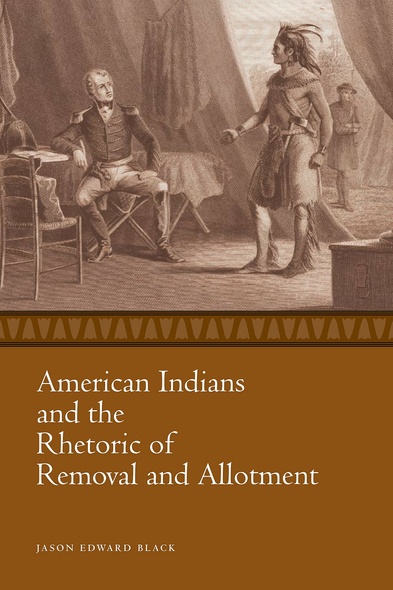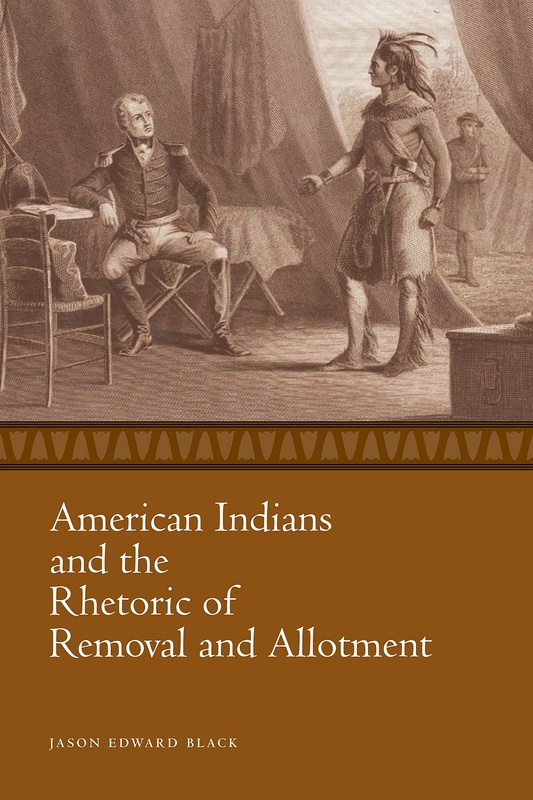
American Indians and the Rhetoric of Removal and Allotment
Jason Edward Black examines the ways the US government’s rhetoric and American Indian responses contributed to the policies of Native–US relations throughout the nineteenth century’s removal and allotment eras. Black shows how these discourses together constructed the perception of the US government and of American Indian communities. Such interactions—though certainly not equal—illustrated the hybrid nature of Native–US rhetoric in the nineteenth century. Both governmental, colonizing discourse and indigenous, decolonizing discourse shaped arguments, constructions of identity, and rhetoric in the colonial relationship.
American Indians and the Rhetoric of Removal and Allotment demonstrates how American Indians decolonized dominant rhetoric through impeding removal and allotment policies. By turning around the US government’s narrative and inventing their own tactics, American Indian communities helped restyle their own identities as well as the government’s. During the first third of the twentieth century, American Indians lobbied for the successful passage of the Indian Citizenship Act of 1924 and the Indian New Deal of 1934, changing the relationship once again.
In the end, Native communities were granted increased rhetorical power through decolonization, though the US government retained an undeniable colonial influence through its territorial management of Natives. The Indian Citizenship Act and the Indian New Deal—as the conclusion of this book indicates—are emblematic of the prevalence of the duality of US citizenship that fused American Indians to the nation yet segregated them on reservations. This duality of inclusion and exclusion grew incrementally and persists now, as a lasting effect of nineteenth-century Native–US rhetorical relations.
Jason Edward Black moves beyond the simple notion of a one-way form of oppressive and colonial communication from the US to American Indians to examine how American Indian rhetoric not only responded to colonizing efforts by the US government but also contributed to the rhetorical culture of the United States. This book is essential reading for anyone interested in historical and contemporary American Indian rhetoric.
American Indians and the Rhetoric of Removal and Allotment represents the high-water mark of indigenous scholarship in rhetorical studies. Through fastidious archival research and careful attention to the complexities of Native rhetorical agency from contact to the Indian Citizenship Act, Black’s analysis of Euro-Indian relations illustrates both the perniciousness of colonial benevolence but also the subtle and subversive ways American Indians decolonized Euro-American discourse, law, and policy. Black’s careful contextual analysis confirms the centrality of Native voices to American public address and documents how the acumen of Native rhetorics at times successfully thwarted the American colonial endeavor. I believe that this ambitious project will be praised by readers as an impressive original contribution to indigenous, postcolonial, and rhetorical studies.
In this treatment of allotment and removal, Jason Edward Black explores American rhetorics of paternalism and subjugation in a nuanced and subtle way. He locates these discourses in historical context, treats them with respect, and carefully parses their various manifestations and consequences. In so doing, Black demonstrates how native voices accommodated, resisted, and contributed to emerging American national identities. Importantly, Black’s analysis invests indigenous people with agency, and thus adds to the growing body of work on decolonialization. This book is an important resource for scholars of American Indian and American national history, decolonialism, and political rhetoric.
Jason Edward Black is an associate professor in rhetoric and public discourse and an affiliate professor in gender and race studies at the University of Alabama at Tuscaloosa. He is the coeditor of An Archive of Hope: Harvey Milk’s Speeches and Writings and Arguments about Animal Ethics. His work has appeared in such journals as Quarterly Journal of Speech, Rhetoric and Public Affairs, American Indian Quarterly, and American Indian Culture and Research Journal.





